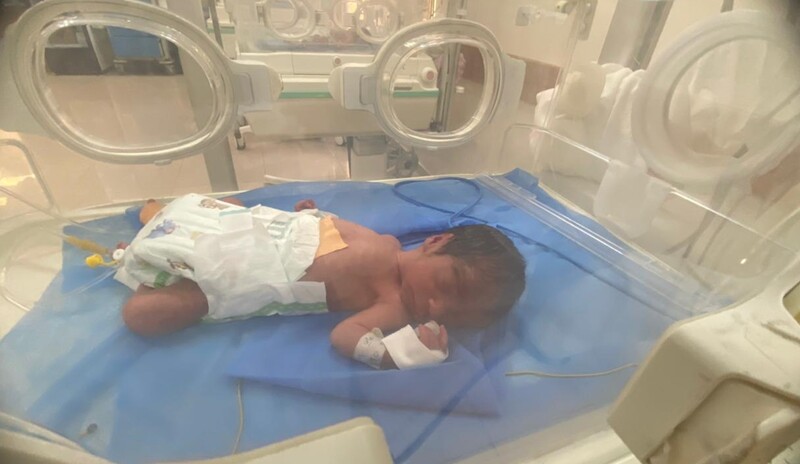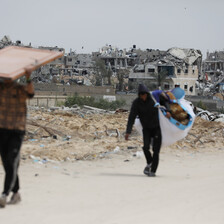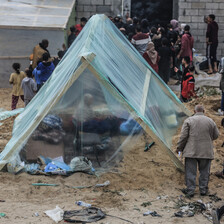The Electronic Intifada 2 October 2024

Eyleen was born prematurely due to complications and spent 28 days in the neonatal intensive care unit at al-Aqsa hospital. (Photo courtesy of the family)
I got married 12 days before Israel launched its attacks on Gaza in October last year.
That first wave of massive air attacks came to define what you might call our “honeymoon.”
My wife, Batoul, and I lost everything. Our home, an apartment in a building in Gaza City’s al-Rimal area, was completely destroyed with everything in it. Our jobs, needless to say, are gone.
I had a real estate business and Batoul was a teacher.
At first we were displaced to a tent in Rafah, in the south, where, one day, in late November, she was complaining of stomach pains.
“Your wife is pregnant,” the doctor I took her to declared.
It was good news in the middle of darkness, destruction, displacement, starvation and fear.
But Gaza is not a place for pregnancy. A pregnant woman needs medical care, healthy food and vitamins.
There was very little of any of that when we got the happy news, as there still is very little of any of that.
During her seventh month of pregnancy, Batoul suddenly started complaining about soreness in her stomach. Then she began screaming in pain. I again rushed her to the hospital.
We first went to the American field hospital, which was being threatened by the Israeli military at the time and was eventually forced to shut in June. There was only one obstetrician there. He examined my wife, but she was still in pain.
We decided next to move to a tent in Nuseirat in the central Gaza Strip to be near al-Awda hospital there.
Once there, Batoul’s blood pressure was checked, and a doctor diagnosed her with preeclampsia, or high blood pressure in pregnancy that might include liver or kidney damage.
It’s not common and often necessitates induced labor. Which, after a week of daily hospital appointments, is exactly what doctors decided.
Eyleen’s first days
Eyleen – as we had decided to call our first child – was born on 21 May. But al-Awda is ill-equipped for a premature baby, and our baby daughter was transferred to the neonatal intensive care unit at Al-Aqsa Martyrs Hospital, where she stayed for 28 days.
And while Batoul was recovering at al-Awda, I was tasked with bringing Eyleen milk from her mother every day.
I also looked for a safe place or room for us to move to. The search proved fruitless, and when Batoul was released, we returned to live in a tent.
Each day I went to see my daughter. Al-Aqsa hospital is also in central Gaza, but a significant distance from Nuseirat. When I couldn’t find a car to take me, I would ride a donkey or a bicycle or just walk.
It was a difficult journey and sometimes a dangerous one, but it was also an amazing feeling for me to be a new father, the responsibility causing me not to fear or falter.
I tried to find clothes for my daughter, but with barely any stores open, this too proved fruitless. Luckily, neighbors and friends came to the rescue.
Eyleen is now four months old. All she has known is a life of displacement and frustration. I sometimes wonder what she must be thinking, the questions she must be asking herself.
When will this bombing end?
When will the air be free from the smell of rockets and smoke?
When will my parents buy me a Barbie?
Do we have to live in a tent forever?
These are all questions to which I fear I don’t have any answers for my daughter.
Yousef al-Hallaq is a law graduate from Gaza.




